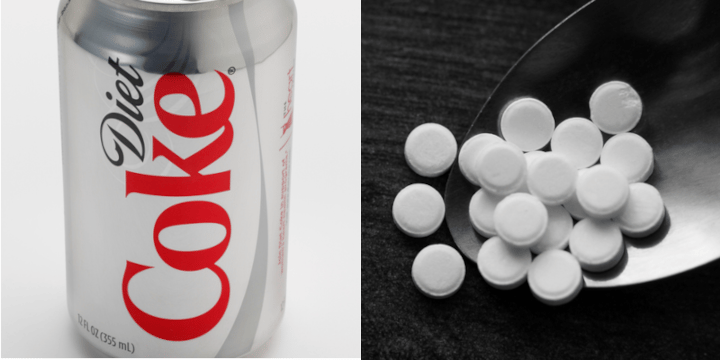Despite the fact that multiple extensive, peer-reviewed studies have been done over the year that proves the safety of aspartame, the sweetener used in Diet Coke and other sugar-free products, the World Health Organization is ready to declare it a “possible carcinogen.”
Of course, pretty much everything on our planet is possibly carcinogenic/killing us in various ways at this point. Just last week, a study was published that KALE of all things contains high amounts of “forever chemicals,” the effects of which we’re not entirely sure yet. However, Diet Coke, a drink that’s been around since 1982, is getting the spotlight.
According to the WHO’s International Agency for Research on Cancer (IARC) will make its final ruling on aspartame next month, but a new study has suggested it could possibly be a cause of cancer. If it goes the way everyone assumes it will, aspartame will be deemed “possibly carcinogenic to humans,” which is admittedly two steps below the more serious “probably carcinogenic to humans” and “carcinogenic to humans.”
“The IARC has assessed the potential carcinogenic effect of aspartame (hazard identification),” the org said in a statement. “Following this, the joint FAO/WHO Expert Committee on Food Additives (Jecfa) will update its risk assessment exercise on aspartame, including the reviewing of the acceptable daily intake and dietary exposure assessment for aspartame.”
Not everyone believes that aspartame is even remotely carcinogenic in humans
Exclusive: Aspartame, one of the world's most common artificial sweeteners, is set to be declared a possible carcinogen next month by a leading global health body, pitting it against the food industry and regulators https://t.co/7Jv2XiJmAU pic.twitter.com/8bKuC53BMx
— Reuters (@Reuters) June 29, 2023
However, Frances Hunt-Wood, the secretary general of the International Sweeteners Association (ISA) said people don’t need to rush to give up their Diet Coke or other aspartame-sweetened products.
“IARC is not a food safety body. The World Health Organisation’s Joint FAO/WHO Expert Committee on Food Additives (Jecfa) is currently conducting a comprehensive food safety review of aspartame and no conclusions can be drawn until both reports are published,” he said.
“Aspartame is one of the most thoroughly researched ingredients in history, with over 90 food safety agencies across the globe declaring it is safe, including the European Food Safety Authority, which conducted the most comprehensive safety evaluation of aspartame to date.”
Kate Loatman, the executive director of the International Council of Beverages Associations, agrees, saying the IARC isn’t “the appropriate authority” to make any such declaration, and in fact, a “more comprehensive” review needs to be done by more qualified organizations.
“While it appears the IARC is now prepared to concede that aspartame presents no more of a hazard to consumers than using aloe vera, public health authorities should be deeply concerned that this leaked opinion contradicts decades of high-quality scientific evidence and could needlessly mislead consumers into consuming more sugar rather than choosing safe no- and low-sugar options – all on the basis of low-quality studies,” Loatman said.
“We remain confident in the safety of aspartame given the overwhelming weight of scientific evidence and positive safety determinations by food safety authorities in more than 90 countries around the world. We, therefore, welcome the broader, more comprehensive food safety review underway by the WHO and the UN Food and Agriculture Organisation Joint Expert Committee on Food Additives.”
Listen, if you’re living on a six-pack of Diet Coke or other diet soda a day, then yes, you likely need to reevaluate your intake and add some fresh H2O to your diet. However, if you enjoy a can or bottle every once in a while or even several times a week as part of an otherwise balanced diet, you’re no more in danger of developing cancer than anyone else breathing in the air outside.



